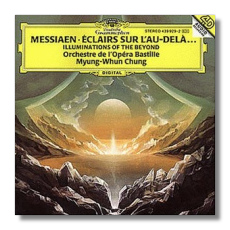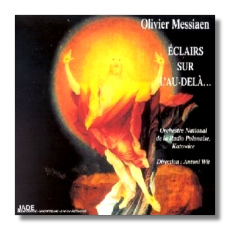
The Internet's Premier Classical Music Source
Related Links
- Messiaen Reviews
- Latest Reviews
- More Reviews
-
By Composer
-
Collections
DVD & Blu-ray
Books
Concert Reviews
Articles/Interviews
Software
Audio
Search Amazon
Recommended Links
Site News
 CD Review
CD Review
Olivier Messiaen

Éclairs sur l'Au-Dela….
Orchestre de l'Opera Bastille/Myung-Whun Chung
Deutsche Grammophon 429929-2 DDD 65:31


Polish Radio National Orchestra, Katowice/Antoni Wit
Jade JADC 099 DDD 62:40
Here are two recordings of Olivier Messiaen's last major work for orchestra, although the composer presented Myung-Whun Chung with a smaller chip off the workbench, and a recording of this should be out shortly on DG. The literally revelatory Éclairs sur l'Au-Dela…, whose approximate English title is "Illuminations of the Beyond," is an eleven-movement work which recapitulates many of the composer's lifelong obsessions, including transcendental Christianity, Indian rhythms, and birdsongs from around the world. There are obvious parallels between Eclairs and the Turangalîla-symphonie, and especially (because of its relative spareness and its more suite-like structure) Des canyons aux etoiles. It is clearly the work of a composer in full possession of his faculties, and yet it also sounds like music written by a man who was already looking less to the Earth and its petty concerns and more to the "Beyond" because of the music's almost unreasonable demands on the orchestra. (I was going to add "to say nothing of the music's spiritual demands," but those have been a constant throughout much of the composer's career.) Its première was given by Zubin Mehta and the New York Philharmonic in that orchestra's 150th anniversary season - perhaps not an ideal choice, although I haven't heard it.
The Wit recording appeared a few months before Chung's. It's a live recording, taped in performance at the 36th annual "Warsaw Autumn" International Festival of Contemporary Music. The Chung is a studio recording. Both conductors worked with the composer on several occasions, and Wit is generally known for his efforts on behalf of 20th-century composers like Penderecki. I fear that people will assume that the Chung recording is preferable because (i) it's on a bigger label, and (ii) Chung's composer-supervised recording on DG of the Turangalîla-symphonie was so excellent, but it's not necessarily so. Some people may have purchased the Wit because it was available first and are now thinking of replacing it with the Chung. I suggest caution. Chung is good, and if you need to hear every little clinical detail of Messiaen's score, then Chung is the man for you. It's true that things tend to get buried in Wit's performance; I think that this is partly due to the recording (which is fine, but not as heavily-engineered as Chung's) and partly due to the more-integrated sound of the orchestra. On the other hand, Wit's orchestra is not inferior to Chung's, and their spiritual involvement seems a little higher. Note that Chung's tempos generally are slower than Wit's, but Chung races through the eighth movement, "Les Etoiles et la Gloire" in 9:20, vs. Wit's 11:20. Messiaen's wife says that this movement should be the score's longest, and it is, but only in Wit's performance.
Another consideration which favors the Jade recording is documentation and presentation. The Jade disc comes in a slipcase (Grunewald's luminous resurrected Christ is on the box), and there is a large multi-lingual booklet which contains an extensive analysis of the work, with musical examples, by Madame Yvonne Loriod-Messiaen. The idealized "4D" sound on the DG recording lets you hear more than the realistic sound on Jade does. I prefer truth to beauty, but you may feel otherwise. Paul Griffith's three pages of notes for the DG disc are helpful, but one really needs more with such a large, new work.
I give the palm to Jade, but I wouldn't look askance at anyone who preferred DG.
Copyright © 1996, Raymond Tuttle


















